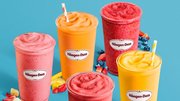Article
Food trucks fuel concept growth
How restaurants throughout the industry are expanding their footprint through meals on wheels.

October 4, 2009 by Cary Stemle — Free-lance reporter, N/A
In New York City, old-line vendors get rough with new ones over turf. In Los Angeles, a Korean taco enterprise creates a social phenomenon. And in Portland, Ore., a familiar burger brand takes it to the street.
While non-branded food trucks have long been ubiquitous in New York, a new breed has emerged over the past few years, giving restaurants across the industry an innovative way to expand their reach. These food trucks are slightly more costly at $40,000 to $100,000 or more, and are often tied to bricks-and-mortar establishments that use Web sites such as Twitter and Facebook to create an air of in-the-moment exclusivity and prompting.
Los Angeles-based Sky's Gourmet Tacos is about to launch the first of several food trucks it has planned for the area within the year. Sky's is a single-unit operation that sells Mexican food with Louisiana influences.
Kevin Minor, who runs Sky's with founder Barbara Burrell, said he has watched the truck movement gain momentum and was finally sold on the concept after the success of Kogi, a Korean BBQ food truck that has reached rock-star status in the Los Angeles area. (There even is a Web site dedicated to L.A. food trucks.)
"Kogi completely changed the LA perception of the ‘roach-coach' cuisine vehicle," Minor said. "That was one thing that had kept us from doing it; you don't want to jeopardize a 17-year good reputation. [But] people in L.A. are so ready right now. It's like stirring a pot with things people don't want — recession and high food costs — with what they do want — good food, inexpensively, close to where they are. The truck scenario speaks very well to that."
The truck idea made perfect sense to executives at Burgerville, a 48-year-old Vancouver, Wash.-based hamburger chain that recently sent its first Nomad — so dubbed for its rambling implications — into service in Portland, Ore., a city with an already-rich food cart culture.
Burgerville CEO Jeff Harvey said the company began thinking about the Nomad this spring as a way to expand the company footprint during a tight economy.
"I began to get curious based on the success of the model and the loyalty it was creating," he said. "Research told me (it) was and is creating very deep relationships with guests in local markets."
Nomad — a 26-foot step-side van with a customized kitchen — is worth about $120,000, he said; considerably less than the $1.5 million price tag that would accompany a new bricks-and-mortar location.
Harvey said social networking is key to the Nomad's strategy, and said the truck helps establish a better presence at events. Harvey admits that while he saw Nomad's potential for helping grow the brand, he's been surprised at how it supports catering. He also sees it as way to serve an area where an existing restaurant may be closed for renovations.
Across all segments
In New York City, food trucks are raising tensions in part because the city limits licenses, which can sell for thousands of dollarson the black market. But the idea has now moved west to L.A., where downscale taco trucks have long ruled, and even to cities like Nashville, Tenn.
Jason McConnell, who operates two upscale restaurants — Red Pony and the Mexican-inspired Sol — in Franklin, Tenn. — recently launched Jay Jay's Good Food Truck, a customized, retrofitted 24-foot vehicle. McConnell's truck will hit the streets in Nashville during weekdays, plying the late-night bar scene and supporting his extensive catering operation.
McConnell will tap into his regular fare and also will adapt menus accordingly — and will use social networking to inform people and build crowds.
"It's not like we have a cooler full of sandwiches," he said. "We are full-on and can make whatever you want most. We may make a batch of ceviche or smoked prime rib, and when it's gone, it's gone."
While McConnell's truck will serve high-end fare, even quick-service brands such as Taco Bell are getting in on the trend. Taco Bell launched a Twitter site this summer to promote the taco truck's whereabouts. The truck went on a cross-country trek handing out free Taco Bell menu items.
As for food trucks' staying power, LA Weeklyfood writer Jonathan Goldnotes that Kogi — led by Roy Choi, former executive chef of the Beverly Hilton and the Border Grill — seems best equipped to serve the large crowds inherent in the trucks' ongoing success.
"(Choi) is good at feeding large amounts of people very efficiently. It turns out that is a very good skill to have. ... Feeding 600 people out of a space the size of a broom closet isn't easy. Preparing to feed 600 and ending up feeding 12 is even harder."
Gold is both a fan of the truck craze and a skeptic.
"With all the food blogs, trucks are getting reams of publicity months before they so much as sell a French fry or a plate of ceviche," he said. "I'm a fan of entry-level capitalism in all its forms. I think the social angle will fade a bit, except for maybe Kogi, but in the worst-case scenario, it will end up providing a higher level of lunch truck in restaurant-poor areas."
Related Media
Food & BeveragePresented ByOracle
Presented ByOracle
 ChatGPT
ChatGPT Grok
Grok Perplexity
Perplexity Claude
Claude












